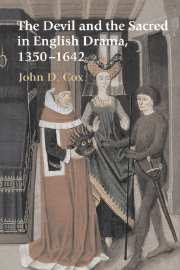Book contents
- Frontmatter
- Contents
- List of illustrations
- Acknowledgments
- Introduction
- 1 Stage devils and oppositional thinking
- 2 The devil and the sacred in the English mystery plays
- 3 Stage devils and sacramental community in non-cycle plays
- 4 Stage devils and early social satire
- 5 Protestant devils and the new community
- 6 The devils of Dr. Faustus
- 7 Reacting to Marlowe
- 8 The devil and the sacred on the Shakespearean stage: theatre and belief
- 9 Traditional morality and magical thinking
- 10 New directions
- Appendix. Devil plays in English, 1350–1642
- Notes
- Index
5 - Protestant devils and the new community
Published online by Cambridge University Press: 22 September 2009
- Frontmatter
- Contents
- List of illustrations
- Acknowledgments
- Introduction
- 1 Stage devils and oppositional thinking
- 2 The devil and the sacred in the English mystery plays
- 3 Stage devils and sacramental community in non-cycle plays
- 4 Stage devils and early social satire
- 5 Protestant devils and the new community
- 6 The devils of Dr. Faustus
- 7 Reacting to Marlowe
- 8 The devil and the sacred on the Shakespearean stage: theatre and belief
- 9 Traditional morality and magical thinking
- 10 New directions
- Appendix. Devil plays in English, 1350–1642
- Notes
- Index
Summary
THE MORE THINGS CHANGE …
The first change in the history of English stage devils is attributable not to incremental secularization, as in the evolutionary story of early drama, but to the Protestant Reformation, which introduced what can best be described as religious secularization. For devils that appear in Protestant plays are no less morally and spiritually serious than devils in pre-Reformation drama, but the assumptions that motivate them are different, and the community they oppose is not that of all baptized Christians but that of the reformed party under the crown – a relatively secular entity when compared to the earlier target of devilish opposition on the English stage. The first Protestant dramatists, John Bale and John Foxe, were themselves formed by traditional religion; Bale spent more than twenty-five years as a Carmelite friar until his conversion to the reformed view in 1533. They therefore understood the devil's role in cosmic history, in the life of the community, and in the individual Christian's life, and they also understood how that role was embodied in drama.
Their deliberate attempt to redefine the devil's role was no mean task, but in the long run it succeeded, even if it did so by compromise, in the manner of the English Reformation as a whole. Demolishing prevailing views through satire and iconoclasm was the first step.
- Type
- Chapter
- Information
- The Devil and the Sacred in English Drama, 1350–1642 , pp. 82 - 106Publisher: Cambridge University PressPrint publication year: 2000



